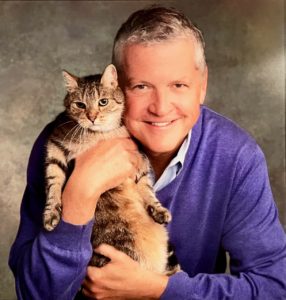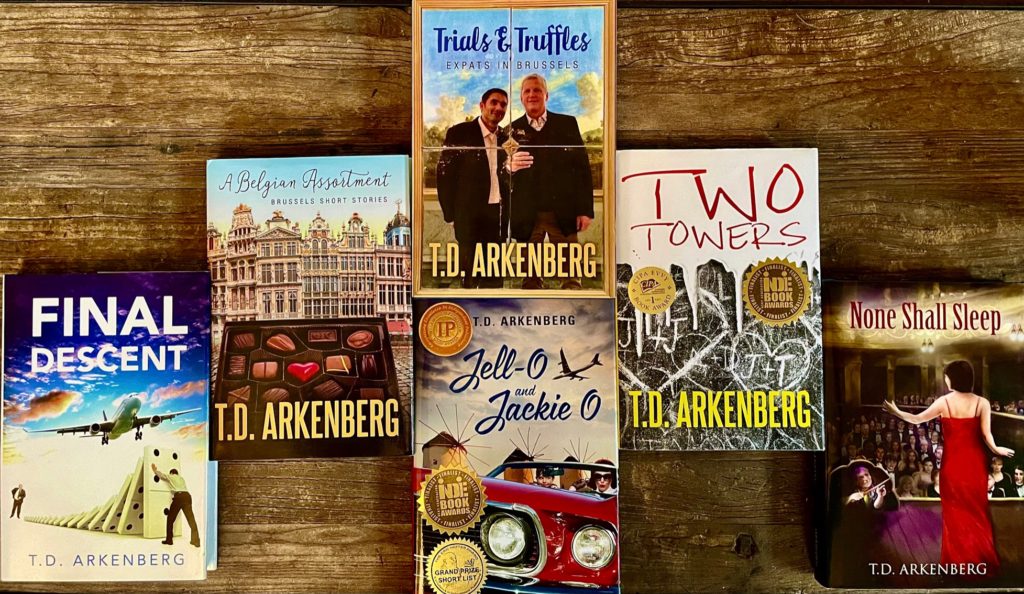
Todd Arkenberg is the author of three novels, two non-fiction books, and a collection of short stories that have received multiple honors and awards. Arkenberg received a BA degree in Literature from Northwestern University and an MBA from The University of Chicago. He is an active member of the Barrington Writers Workshop. See his website at tdarkenberg.com
Why, in your late 40s, did you decide to forgo your career as an airline executive to write full time?
After 23 years in various executive positions at United Airlines, I decided the time was right to leave the corporate world. I’d just completed a major project to create a platform and framework for cultural change at the airline. I’m proud of my work at United and still consider many of my colleagues, dear friends. A supportive spouse with a good job made my risky decision possible.
You’ve written non-fiction, short stories, and novels. Which writing project are you most proud?
They’re all kind of like one’s children, aren’t they? How do you name your favorite, at least publicly? Although I’d say they were each written at the appropriate time in my life and writing career, my heart will always be with fiction, long fiction. Novels have always been my first love to read so I guess they’re my love to write – a vast horizon over which the author can sow one’s plot and ideas with hopes of reaping a rich and satisfying conclusion.
In your experience which was the hardest form to write in? Which was the most fun?
Each genre presents unique challenges and benefits. And within genres, some books are harder to write than others. For example, my third novel contained numerous characters and spanned many years. Keeping track of the characters and presenting their inter-locking stories wasn’t easy. Among the genres though, memoir requires deep soul searching and dredging up painful moments. Emotionally, my first memoir, Two Towers, was the most difficult. The story focuses on the toughest time in my life, 1998-2001. It was a perfect storm of personal risk and tragedy set against the epic events of 9/11 that forever changed my employer, United Airlines, as well as the world. I tried to present the rawness of that time along with the hope for the future. To me, that mix of tragedy and hope seems the essence of the human condition, not so different from the pandemic world of today. The most fun? Probably fiction. I love creating unique and interesting characters, people who I’d love to be in real life but don’t dare.
You say, “Good writing is sensory.” What do you mean?
Writing I love transports me to another world or maybe even the same world but from an entirely unique perspective. To be successful, a good writer steeps his/her reader into the story. A complete scene brings in as many of our human senses as possible. When I read a book that ignores everything but audial and visual clues, I feel cheated. Some even short-change sound. I owe an awful lot to BWW’s critique sessions for my sensitivity to sensory writing. “What did that old cabin smell like? What odors did the kitchen emit? What flavors were in that home-cooked meal? What did the plush upholstery in the limousine feel like?” were typical questions critiquers asked when reviewing writing passages. Among writers, poets I think understand the importance of sensory anchors best.
What advice would you give to an aspiring writer?
Discipline yourself. That’s been my key to success anyway. I brought many of the skills honed from my years in the corporate world to my writing craft. I write Monday thru Friday. Having said that, it’s also important to remember that every writer is on his/her own path. There is no single formula or magic bullet. Try to have fun and try to keep things in perspective. At the end of the day, remember that the only person you have to please and satisfy is yourself. You’re your best and most reliable cheerleader too.
For you, what’s the best way to evoke a feeling or moment in your books?
Not all scenes and characters are created equal. Important ones deserve more attention and detail. The same is true for pivotal moments. The ones you want to pop must look and, more importantly, feel unique. For example, here’s where sensory anchors come into play. You want your reader to feel a deep and emotional connection. Watch the language, both narrative and dialogue. Symbolism is great here. Think how you can leave a lasting emotional imprint on your reader akin to a photograph or a song you can’t get out of your head.
What are some of the ways the BWW critique process helped you with your writing?
Without question, BWW elevated my writing. New to the craft back in 2010, my writing plateaued. Finding BWW, the critique sessions taught me how to look at my writing in new and unique ways. Feedback, especially the kind that’s constructive, actionable, and respectful, is extremely valuable. I found critiquing the works of others and the discussion that followed as valuable as reviews of my own work. Sometimes even more so. Early on, we had one member who brought in copies of chapters from a writing manual. I still refer to these today. Another beloved member was a stickler for point-of-view. I’d never heard of it before her valuable insights. The key is respect.
You published your books through Outskirts Press. What do you like about them?
When I first looked to publish, Outskirts Press was rated among the top of self-publishers. But publishing is a dynamic industry. The competitive field is daunting, which is a blessing and a curse for authors. First and foremost, Outskirts produces a great, quality product. I couldn’t be happier with the physical books themselves. However, they’re expensive and get more and more costly with each title. Communication is slow and restricted to emails. And make no mistake, it’s a purely transactional relationship. Everything is fee-based. They’re producing your book, not nurturing a literary relationship. There are much cheaper ways to get your book to market than Outskirts. There is a $25 per year/per format fee to keep the title active.
Was there something about your books’ publication that surprised you?
On the positive side, I was most pleased and surprised that my book was available worldwide. Having worked for a global airline and having lived in Europe, I have many overseas friends who easily got copies of my books. On the downside, the small percentage an author earns in royalties for print books surprised me, roughly 15% on average. Because of special fonts and color photos, my last book, Trials & Truffles, Expats in Brussels was very expensive to produce. For this title, my royalties for hardcover and paperback are under 4% of the retail price. Most authors love to write regardless of financial realities.
Do you submit your books for consideration in award competitions or did your publisher do that?
As an Indie author, I’ve had to personally submit my works to literary competitions. It’s not generally something Indie publishers do without a fee. I encourage authors to submit their works for award consideration. It’s a great way to get objective affirmation. Awards are international in scope and are fiercely competitive. To win, place or show is a great honor that helps promote your book. It’s also a great ego boost in a profession where backslaps are rare.
What are you working on now?
For my current writing project, I continue to harvest from our experiences living in Brussels. The upcoming book, My Single and Extraordinary Life is a feline memoir. Of course, it’s memoir in name only. The story is written from the perspective of our neighbor’s curiously intrepid cat who hopped the garden wall daily to eavesdrop on his American neighbors. Our neighbor was kind enough to understand that her cat wanted to repatriate with us back to America.
What are you reading now? Any recommendations of authors?
Although in recent years I find myself drawn more to nonfiction, specifically history and biography, I’m currently reading two fiction books, Tolkein’s Two Towers and, The Historians by Cecilia Ekbäck. The latter is a 2021 title. Although classic writers like Hardy, Austen, and Dickens are favorites, I force myself to read fresh new titles/authors. It’s important for writers to keep abreast of trends in writing. As brilliant as Dickens is, most of today’s readers wouldn’t have the patience to read his 800-page, description-heavy masterpieces. The cliché is true, good writers are voracious readers. Read, read, read.
My favorite books on writing include works by Anne Lamott and Stephen King. I encourage all writers to read King’s, On Writing. The book is one-third autobiography and two-thirds writing guide. It’s my favorite King book and spoke to me. You’ll never look at an adverb the same way again.

